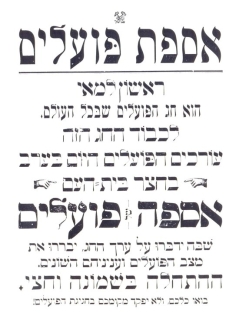Can Netanyahu cross the Rubicon?
Thank you for rating this article.The story is seven decades old: to partition the land between the Jordan River and the Mediterranean, or not? The only realistic answer to the Israeli-Palestinian conflict is the same now as it was in 1948: two states for two peoples.
The elements of a two-state solution are known. The Palestinians would make their state in Gaza and major parts of the West Bank. A special and creative arrangement would be agreed upon regarding Jerusalem, while the Old City would remain under Israeli sovereignty.
Israel must make the painful compromise of giving up the cradle of Jewish civilization, and over 150,000 Israelis in outlying settlements would be withdrawn, or stay under special arrangement in the new Palestinian state. Palestinians must give up their dream of having descendants of Palestinian refugees “return” to Israel. Instead they will be able to immigrate to the newly created state of Palestine.
Whether this will come to pass is a question of will and leadership on both sides.
The Palestinian leadership has scuttled a number of previous attempts to partition the land. Their fundamental challenges remain twofold. First, they may regard Israel’s creation as an injustice that occurred at their expense, but they must accept the Jewish state as their neighbor and build their state in the West Bank and Gaza.
Second, they are dealing with their localized version of the global phenomenon of violent Islamic fundamentalism (Hamas, Islamic Jihad, etc) that is irredeemably anti-Semitic, makes maximalist claims and rejects any Jewish presence in the Middle East.
Both problems can probably only be overcome, if at all, by a Palestinian de Gaulle.
On the Israeli side, the prevailing sentiment among some leading rightist figures is that the status quo is a sustainable long-term option. They imagine a series of vaguely defined “interim agreements” with the Palestinians, endless negotiations, and maintaining indefinite Israeli control over the West Bank. In other words, stringing the Palestinians along.
This appears to still be the Netanyahu school of thought.
These figures are joined by a chorus of those on the far right who argue for “solutions” of varying levels of outlandishness that always involve annexing the West Bank and somehow maintaining a Jewish majority in Israel.
It must be said that there are many legitimate security concerns that most Israelis share. Just last November, southern Israel and even Tel Aviv were hit by hundreds of rockets from Gaza, from which we have already withdrawn.
Without an Israeli military presence on the West Bank, what is to stop extremists or a future rogue Palestinian administration terrorizing the heart of Israel from the high ground of the Judean Hills? And will the Palestinians, headed by Palestinian Authority President Mahmoud Abbas, declare an end to all future claims and uphold a peace agreement? Can they? These political and security concerns must be addressed before we relinquish the West Bank. But relinquishing the West Bank is what we must do to remain a Jewish democracy.
As a proud member of the Labor Party, I can tell you that most of the great Zionists of history, from David Ben-Gurion to Yitzhak Rabin, and even Menachem Begin, were pragmatists. The irredentist fantasy of a “Greater Israel” was never a pillar of the Zionist idea. A Jewish democracy living at peace with its neighbors is a far higher imperative.
Given all of this, has Prime Minister Binyamin Netanyahu “crossed the Rubicon,” as contemporary Israeli political parlance has it, and decided to be Israel’s de Gaulle? Can he tell the far right and the settlers “je vous ai compris” and proceed to forge a true peace with the Palestinians? And, after that, can he respond to the Arab Peace Initiative and ink a broader deal with the entire region? Netanyahu’s entire political career has been predicated on indefinitely postponing Palestinian ambitions and preventing a final-status agreement. His Likud party has been subject to a hostile takeover by the most radical elements among the settlers, who essentially stacked the branches during the primaries last year and created the most extreme Likud list in history. This is not Begin’s Likud anymore.
To make matters worse, there are Netanyahu’s leading coalition partners. Finance Minister Yair Lapid is a human weathervane whose only firm principle is his ambition to be prime minister (though his support last week for the peace process at the Globes Conference was a refreshing sea change.) Foreign Minister Avigdor Liberman’s party, Yisrael Beytenu (Israel is Our Home), tried to force Arabs to take loyalty oaths, and was accused by none other than the ADL’s Abraham Foxman of “restricting democratic values.” And Naftali Bennett, head of the far-right Bayit Yehudi (Jewish Home) party, has declared the two-state solution “dead.” I do not envy Netanyahu.
Things do look bleak, but there are reasons to be hopeful.
Just a few months ago, I hosted a group of Palestinian officials at the Knesset. For the first time, the Palestinian and Israeli flags were raised in the Knesset chamber beside each other. The spirit of peace was in the air.
A few weeks later, President Abbas invited our Knesset caucus to visit the Mukata in Ramallah, and we sat with him and talked. And, though postponed due to the storm, over the next couple of weeks more than 200 Israeli students will visit the Mukata and dialogue with Abbas.
Trust is not a prerequisite to peace, but an outcome of it. We have an obligation to try and try again for it, even when its prospects appear dim. I firmly believe that when the leaderships of Israel and the Palestinians are composed of the right people, and they decide to make peace happen, peace can be made.
And as for Netanyahu, one publication described him few months ago as “King Bibi.” He will have to decide if history will remember him as “king of Israel” or “king of the Likud.” It’s up to him.
The author, a Knesset Member, is Deputy Knesset Speaker, secretary-general of the Labor Party and chairman of the Knesset Caucus to Resolve the Arab-Israeli Conflict.
--------------
פורסם באתר ג'רוזלם פוסט


